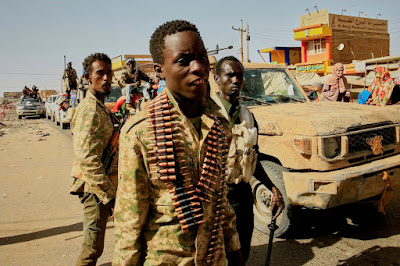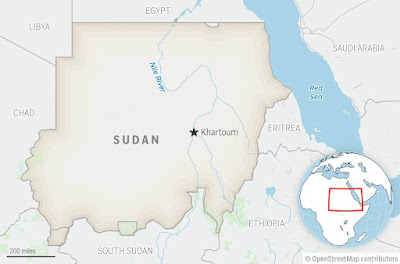NOTE from Sudan Watch Editor: I have created a transcript of this video. It is copied in full below. The video can be viewed here.
Video interview from France 24 GuardianTV
Presented on Tete a Tete by Marc Perelman [MP]
Dated Sunday, 21 April 2024, 1:48pm
Situation in Sudan ‘probably the most disastrous in the world’, says former PM Hamdok
FRANCE 24 spoke to Abdalla Hamdok, who served as Sudan’s prime minister twice after the fall of Omar Al-Bashir in 2019. As the war in his country entered its second year, the former premier described the situation as “extremely catastrophic, probably the most serious, disastrous situation in the world today”. Yet he expressed hope that the war “will come to an end”, noting “some progress” in regional and national efforts towards a political solution.
MP- Hello and welcome here on France 24. Our guest today is Abdullah Hamdok. He is the head of Sudan's Tagaddum. It’s a coordination of civic democratic forces. He was prime minister after the fall of the regime of Omar al-Bashir in 2019. He was pushed out by two military leaders General Al-Burhan and General Hemeti, who since then have been fighting a war, a civil war, and it’s been one year now.
MP- Thank you very much for being our guest today, Mr. Hamdok.
AH- Thank you very much for having me. It’s always a pleasure to meet France 24
MP- How would you describe the situation in Sudan exactly one year into this war?
AH- What is happening in Sudan today is extremely catastrophic. Probably the most serious disastrous situation in the world today. We're facing a situation whereby more than 2 million refugees, close to 8 million internally displaced people, but more than that, about 25 million are subjected to famine and starvation.
MP- That's half the population.
AH- Absolutely. Because of this disastrous war, senseless war.
MP- The death toll is often put around 13,000 to 15,000. Is this the real death toll in Sudan?
AH- Absolutely not. I think this is grossly underestimated. The death toll could be multiples of that. I would like to think we might never be able to know the exact number of people who lost their life in this war.
MP- How would you describe what is happening? Is it a civil war? Is it a war where war crimes, crimes against humanity, even genoicde are being committed? What words would you use?
AH- This is, it is indeed a civil war, but I think this is not the first war in the history of Sudan. Our first was started in 1955, just a year before independence of Sudan, 1956. And there are so many other wars. The war in the South last for so many decades. The genocide war in Darfur, the war in the Nuba Mountains, the Blue Nile, the East and all that. But this current war is different from the previous wars. In the past, the wars were in the periphery, in the regions. This time, the war started in the center and engulfed the whole country. So in that sense, it is an all-out war in the whole country.
MP- Is it a war between two men and two ambitions? Is this what it's all about?
AH- I think this is again another misconception of the Sudanese war. Portraying it as a fight between two generals, this is far from that. It is a war that has its root causes in history, in issues of marginalisation, which whether it's ethnic, regional, religious and all that. It's a war created essentially by the historical model of development, issues of underdevelopment, and many of this. So I think in the beginning of the war even the international community has perceived this war as a fight between generals which is totally missing the point. But I think with the concerted effort by civilians, by many actors this conceptualization is changing now and everybody is beginning to understand it this war is much deeper than that which hence requires different instrument and different engagement and approaches to address it.
MP- Well, how do you address it? Do you see any light at the end of this tunnel you just described?
AH- It's a disaster situation today but I'm an eternal optimist. I don't think there is a war that can last forever. It will come to an end.
MP- How?
AH- Our desire and our hope that it will stop yesterday, today before tomorrow, we're working on that. As you put it in your introduction, I had this Tagaddum Group. We had a meeting early this month in Addis Ababa. We came up with about what we call political vision as a contribution to address this war, which we had a vision which has four components. If I can briefly just mention them. Number one, we agreed on what we could call Declaration of Principle which addressing fundamental issues of the unity of the country, one army, issues of justice and transitional justice, calling for democratic rule, federalism, addressing issues of building state institutions and all that. But also a political process, which has so many components. And then we addressed also the issue of the negotiation venue and all that.
MP- Right, but as we speak, there have been attempts by regional organisations, by the African Union, by Saudi Arabia, the US, what’s called a Jeddah process but nothing’s working. The war is raging on. Why?
AH- Let me start by appreciating all this effort by the regional organisations, community and the international community.
PH- But they’re not working.
MP- They are not, we know they are not because it is a complex issue. But I think we are seeing some progress in this. If you remember, when the war started, we had the Jeddah process, which was coordinated, led by the United States and Saudi Arabia. It made some progress, but after a while, it got stalled. But also the African Union got involved in this. The neighbouring countries, there was the neighbouring country initiative put forward by Egypt and IGAD also intervened, a number of other regional countries. I think we are seeing gradually some sort of convergence. The Manama initiative or encounter which happened probably two months ago, we think it’s a step in the right direction bringing more actors into the process. Now we are hearing more effort is being made to expand this a little bit by involving other actors. And that’s the only assuring way. Certainly, we do not want to see proliferation of initiatives and forum, and we want to avoid what we can call forum shopping. So we wanted a coordinated process that is coordinated in one centre. Of course, modern mediation would have built into into it multiple maybe approaches, but we don’t want parallel. We want it to be coordinated by one centre.
MP- Right, and who should be the center?
AH- I think currently the revive, enhance Jeddah that will take on board all the other initiatives will be the right way to go.
MP- Right, the problem is bringing both generals to the same table. You had a meeting with General Hemeti in Addis Ababa in early January. You said this was a building block and you were hoping that General Al Burhan would also meet with you. That hasn’t happened. Why has he refused to meet with you? Because he thinks that you’re siding with General Hemeti maybe?
AH- There is a lot of, maybe what you can call it, accusation in that direction. But end of last year in December we wrote to both generals, to General Burhan and Genera Hemeti asking them to meet. General Hemeti responded. We met him in Addis. We agreed and issued Addis Declaration which is essentially having all these ingredients of going back to a civilian rule, declaration of principle, protection of civilian and all that. General Burhan responded saying that in principle he would not have a problem in meeting. But this has yet to materialise. In our meeting in Addis Ababa early this month we again confirmed and affirmed our desire to meet him. And we will continue pursuing that because we think this is the only assured way and it is in the interest of our country because there is no military solution to this.
MP- Does this mean that General Hemeti is more committed to a peaceful solution than General Burhan who seems not really very interested in this?
AH- Well, we take them with their pronouncements. General Hemeti, we met with him. He agreed with us that we need to go through a political process. We are yet to hear the same sentiments echoed by Burhan.
MP- Right. In early April, the public prosecutor filed criminal charges against you and a dozen of other members of, let’s call it the anti-war coalition, for quote unquote inciting war against the state. This carries the death penalty. What is your reaction to those very serious accusations and what does it mean?
AH- Well, I leave the judgement to the largest population of Sudan and the region and the international community. But it is quite a funny thing. We are a civilian group. We do not carry arm inciting violence and all this is just fictitious. They have accused myself and more than 40 of our colleagues of inciting violence against the state which is totally fabricated. And I don’t think it is helping. We would like to see ourselves as Sudanese engaging at a much higher level of seriousness in addressing the crisis of our country.
MP- Is this a response of a general, Al Burhan maybe? Because one can assume the public prosecutor did this maybe on his behalf.
AH- I don’t believe the prosecutor just woke up and did this.
MP- So you think this is a negative response to Al Burhan?
AH- Absolutely, I mean it has to be decided from somewhere in the circles, yeah.
MP- Abdalla Hamdok, it’s me who wants to thank you very much for appearing on the France24 channel and thank you all for watching this interview.
See video here: https://tv.guardian.ng/news/world-news/situation-in-sudan-probably-the-most-disastrous-in-the-world-says-former-pm-hamdok/
____________________________
Related
Sudan Tribune - April 20, 2024
Sudanese political figures discuss path to peace at Geneva workshop
Photo: Smoke rises from Sudan’s capital as conflict grips Khartoum on May 19, 2023 (AFP photo)
It’s important to note that representatives of the former regime and the warring parties were excluded from the Geneva meeting. All other Sudanese political forces were invited regardless of their stance on the conflict.
This workshop echoes a similar agreement reached at a Paris meeting organized by France on April 15th. The Paris seminar included only civilian actors, while the Geneva meeting, in addition, involved the armed movements that signed the Juba peace agreement.
Read full story: https://sudantribune.com/article284685/
END


.jpeg)






